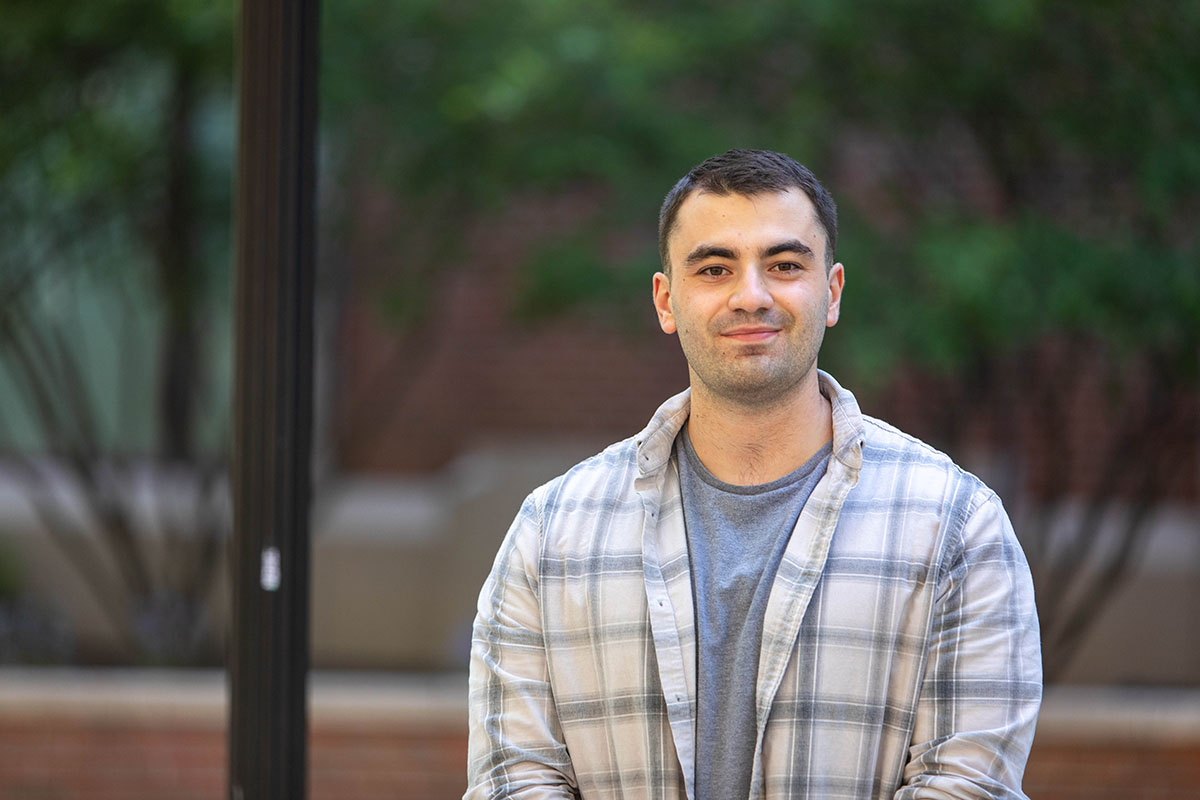 Joshua Chis will graduate with degrees in mathematics and physics this June (Photo by Keeton Holder/DePaul University)
Joshua Chis will graduate with degrees in mathematics and physics this June (Photo by Keeton Holder/DePaul University)Joshua Chis, College of Science and Health
Degrees: Bachelor of Science in Mathematics, Bachelor of Science in Physics
Hometown: Lincolnwood, IL
What was the beginning of your DePaul journey like?
I’m a first-generation student and didn’t know a single thing about this whole college system coming in. Everybody was a bit more lenient because of COVID, though, and that gave me more time to figure things out. I also got to know a lot of my professors that first year and they started to say, “Come to my office hours. Let's chat about whatever you’re interested in.” That turned into “There’s this research opportunity if you want to get involved.” You don’t expect somebody to give you that amount of time. As a student, that really tells you something. As a first-generation student especially, that told me, “Hey, you’re wanted here.”
What are your research interests?
I’m really interested in probability theory. Specifically, I enjoy studying stochastic processes — which is just a fancy term for random processes. They come up everywhere in finance, physics and other sciences. Researching models that replicate these processes and characterizing them using mathematics is interesting to me. I’m specifically interested in looking at how these random processes govern market behavior.
My first summer conducting research in the physics department kicked off a lot of my work now. It was unique in the sense that it was a project I got a lot of control over. What I wanted to research, how I wanted to research it — that was all up to me, and my supervisor was there to direct me after the fact. It was a time when I really started to become an agent of my own learning.
How have you connected with the university community during your time here?
A lot of the communities I’ve found at DePaul have been academic, and they’ve given me the opportunity to see what teaching and mentoring are like. Once we were back on campus after COVID and I got more settled in, I started to take on more roles. I became the president of the Society of Physics Students, the vice president of our math club and a research mentor in the Rising STEM Scholars program.
I was also a Chicago Quarter Mentor, and, in that role, you get to really embody the idea of being of service to your community. The Chicago Quarter experience makes you appreciate just how difficult that first year of university can be, but it also shows you how rewarding it is. Getting to come back to these first-year courses as a CQM meant that I could support new students through that process, give advice and help them build momentum in their college career.
What does DePaul’s Vincentian mission mean to you?
My time here has made me someone who, no matter where I am, looks at ways that I can help the people around me. My parents didn’t go to college, and they’ve got this incredible work ethic that’s really rubbed off on me. It just so happened that their value set and DePaul’s sort of meshed. They embody everything that I wanted to be while I was here at DePaul, and everything I want to be when I leave DePaul. I think that meshing those values really boosted my appreciation for the idea of being of service to others.
What do you plan to do next?
I’ll be interning at Arbor Financial Advisors in Chicago this summer. I plan to start my master’s program in financial mathematics in August 2025, but I haven’t gotten confirmation of getting in just yet.
I ultimately want to work in quantitative finance because it’s an industry full of interesting mathematics, and it intersects with so many different fields. As a student, I felt that the world of quantitative finance was relatively mysterious. It was difficult to build connections and secure positions at firms. I also wasn’t sure of the education I needed. These challenges are part of the reason I want to enter the industry, so that I can help students chart a clearer path and find the experiences that I was looking for as a student. I feel that the more we involve students in that career discovery process, the better.
What advice do you have for incoming students?
I didn’t have the strongest academic background coming out of high school, so I was initially a bit afraid to speak up in classes and engage in lectures. I would tell any student to aim to be a part of the conversations going on around them, whether it be in class or clubs. Be a part of a community — help build it up or help sustain it. Don’t be afraid to find out where the conversation is happening and be there for it.